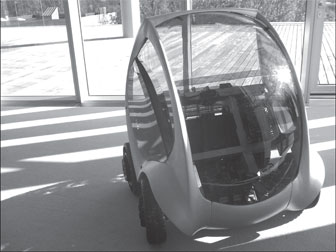Will life in 2038 be computer-controlled?
By Lionel Wijesiri
Albert Einstein claimed he never thought about the future. “It will
come soon enough,” he said. Today, we can see his point. What would have
been the good of worrying about our destiny when it was not of our
making?
 |
|
An artist’s view of how
cities will look in 2038. Concrete jungles with no human
beings visible! |
Yet, life has changed since the great physicist’s day. Sweeping
changes of our own creation now plague our world: Carbon emissions,
soaring populations, cloning, rising extinction rates... We are changing
our planet in ways that were once unimaginable.
We are also developing lifesaving technologies that would have
appeared equally incredible a few decades ago. Everywhere we witness
change. For better or worse!
The change
This ‘change’ confronts us with a million-dollar question: Where will
we be in the year 2038, 25 years from now?
All in all, it is a sobering thought. Maybe, we should not be too
downhearted about our prospects for life in 2038. As a wise guy in my
office once observed: “You needn’t worry about the world coming to an
end today. It is already tomorrow.”
I want to let my imagination run prophetical (not riot) and visualise
the scenario of my home town in 2038. (Of course, I will be dead and
gone and might not be able to judge whether my predictions came true or
not).
Morning session
In the village of Rajagiriya, Sunil wakes up to soft music from a new
song (that has been downloaded based on his preferences) to find the
water in his shower preheated (hot water is at the shower head). By the
time he comes out of the bathroom, his coffee is ready (the bedroom is
powering down).
There is a slight hum as the family water purifier switches on, and
as Sunil walks down the hallway, he taps the electricity meter which
shows that the family is in credit: His own windmill generator and solar
panels are contributing more energy into the grid than the household is
using, adding to the family income.
In the kitchen, his wife is complaining. The “smart fridge” has
malfunctioned and the order for milk and bread, which should have
reached the local delivery service, has not been sent. The grocer, who
employs a refugee from a Maldives island that disappeared three years
ago as sea levels rose, will have to be telephoned instead. Food
deliveries go in a special lockable box rather than on the doorstep,
since theft of these increasingly expensive essentials is a growing
problem.
Driving out
Sunil uses a hydrogen-powered car to travel. When he is at home, a
telephone in his ear, which operates on electricity generated by his
brain, allows his office staff to speak to him at any time during
working hours. This, among many new electronic devices which are
supposed to make him more efficient, are regarded by Sunil with
scepticism.
Today, as he drives to pick up a foreign delegate, he carefully
selects his route to avoid congestion charges on the motorway or in any
of the towns on the way. His company long ago moved out of Colombo
district to cut costs.
Sunil has a daughter, adopted like many other children: Sperm counts
for the average male have dropped to 30 percent of the 1950s level,
because the chemicals widely used in food and farming have damaged
fertility.
It is no satisfaction that many large food manufacturers have gone
bankrupt in the last few years because of legal action brought by people
who are no longer able to have children.
Outdoor scene
The clampdown on food preservatives and high oil prices mean that
sending fresh food long distances is prohibitively expensive. The family
keeps chickens to have a supply of fresh eggs and grow vegetables
because imported food is now an expensive luxury. The warmer climate
means melons can be grown outdoors, although it also has led to a
malaria scare in villages.
 |
|
Is this the car of the
future? The CityCar is a small super efficient electric car
that is designed to transport commuters around urban
landscapes and campuses. The car is smaller than a Smart Car
and gets up to 200 miles per gallon and is well suited to
redefine sustainable urban mobility |
On the brighter side, the air in the cities is cleaner, public
transport is much better, and because of congestion charges and working
from homes, traffic jams are becoming a distant memory.
Sweeping floors, dusting, cleaning windows and cutting grass are done
by domestic robots. The public have happily accepted robots scuttling
around their homes and gardens. They are smart, ready to attack their
tasks out of the box and are comfortable with humans and other smart
robots. Most home robots have names and are treated like pets.
Personal life
Sunil is a senior partner in the company, but there is no corporate
headquarters to visit and no city-centre office to travel to each
morning. Technology means that daily commuting is a thing of the past.
Like most people in the 21st century, Sunil now works largely from
home. While he has been eating breakfast, the computer-controlled
household administration system has laid out his virtual desk with
jotter and touchpad, turned on the communications systems and opened the
files it knows he is going to need today. Sunil clicks on the secure
company intranet. On a second screen on the wall is a football match
taking place on the other side of the world. Leisure and work are
seamlessly integrated.
This morning, Sunil needs to contact a lawyer in USA. In the early
days of his career, he relied on old-fashioned webcams, Skype and
instant messaging to talk to people on “the outside”.
However, a conference call today is just a matter of summoning work
colleagues into your own virtual study environment and discussing sales
figures face to face, even if the participants are all sitting tens of
thousands of miles apart. And nobody has to put up with a dreary,
unproductive nine-to-five job just for the pay. Work is by definition
creative, knowledge-based, intellectual, stimulating and fun. The latest
versions of massive bandwidth Internet using super-efficient cabling
ensures that information of all types can be accessed immediately and
interchanged instantly.
Most “dirty” jobs are done automatically by machines. Sunil would be
amazed to meet someone driving a delivery truck, sweeping the streets or
mixing concrete, while those who once operated ticket offices or sat at
reception desks have simply been replaced by automatic devices.
Human interaction
Even jobs such as nursing or policing will become dominated by
automation: A nurse will care for a patient by sensors, data banks and
screens, administering drugs remotely, while the job of a police officer
will be carried out once a suspect is handed over to the automatically
controlled combined police/courts/prison complex.
However, everyone agrees there will remain a need for human
interaction every now and again. So, on Tuesday night, Sunil will go by
electric taxi, paid for by universal credits transferred to his
smartcard, for a sociable after-work meal and a chat with a colleague, a
real human being. And they’ll talk about football and the shortcomings
of the latest computer-controlled oven. Some things never change.
At the core of all of these initiatives is the idea of freeing up
time, giving people their lives back, and using technology to provide
more time to enjoy life rather than filling up every free moment with
additional technology and management chores. So if our lives are indeed
improved by 2038, it is probably a safe bet that Intel likely had a lot
to do with our brave new future.
|



